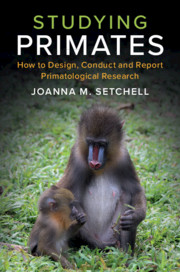Book contents
- Studying Primates
- Studying Primates
- Copyright page
- Dedication
- Contents
- Preface
- Acknowledgements
- 1 Asking Questions about Primates
- 2 Ethics in Primatology
- 3 Keeping Science Healthy: Research Integrity
- 4 Inclusive Science
- 5 Understanding Statistical Evidence
- 6 Communicating Ideas in Writing
- 7 Introduction to the Primates
- 8 Why Study Primates?
- 9 Identifying a Research Question
- 10 Finding Out What We Know
- 11 Reading Journal Articles
- 12 Formulating Hypotheses and Predictions and Designing a Study
- 13 Observing and Manipulating
- 14 Choosing Measures
- 15 Planning Data Analysis
- 16 Sampling and Statistical Power
- 17 Checking Feasibility and Finalising Your Plans
- 18 Writing a Research Proposal
- 19 Collecting Data
- 20 Conducting Fieldwork
- 21 Analysing and Interpreting Data
- 22 Writing a Scientific Report
- 23 Submitting to a Peer-Reviewed Journal
- 24 Presenting Your Work at a Conference
- 25 Conclusions
- Index
- References
20 - Conducting Fieldwork
Published online by Cambridge University Press: 19 September 2019
- Studying Primates
- Studying Primates
- Copyright page
- Dedication
- Contents
- Preface
- Acknowledgements
- 1 Asking Questions about Primates
- 2 Ethics in Primatology
- 3 Keeping Science Healthy: Research Integrity
- 4 Inclusive Science
- 5 Understanding Statistical Evidence
- 6 Communicating Ideas in Writing
- 7 Introduction to the Primates
- 8 Why Study Primates?
- 9 Identifying a Research Question
- 10 Finding Out What We Know
- 11 Reading Journal Articles
- 12 Formulating Hypotheses and Predictions and Designing a Study
- 13 Observing and Manipulating
- 14 Choosing Measures
- 15 Planning Data Analysis
- 16 Sampling and Statistical Power
- 17 Checking Feasibility and Finalising Your Plans
- 18 Writing a Research Proposal
- 19 Collecting Data
- 20 Conducting Fieldwork
- 21 Analysing and Interpreting Data
- 22 Writing a Scientific Report
- 23 Submitting to a Peer-Reviewed Journal
- 24 Presenting Your Work at a Conference
- 25 Conclusions
- Index
- References
Summary
Fieldwork can be exciting, and even addictive, but it can also be daunting and dangerous. Fieldsites range from a tent to established research stations. You may be close to home, or on the other side of the world. National researchers may be just as foreign to a local area as non-national researchers. You may be in a familiar environment or in a very unfamiliar one. Fieldwork often involves sharing living space with other people, and with wildlife. In this chapter I begin with what it takes to be a fieldworker, then cover permissions and logistics, field kit, personal safety, the social context, LGBTQIA+ concerns, natural hazards, physical health, mental health, and returning home.
Keywords
Information
- Type
- Chapter
- Information
- Studying PrimatesHow to Design, Conduct and Report Primatological Research, pp. 247 - 262Publisher: Cambridge University PressPrint publication year: 2019
References
20.13 Further Reading
Accessibility standard: Unknown
Why this information is here
This section outlines the accessibility features of this content - including support for screen readers, full keyboard navigation and high-contrast display options. This may not be relevant for you.Accessibility Information
- 1
- Cited by
